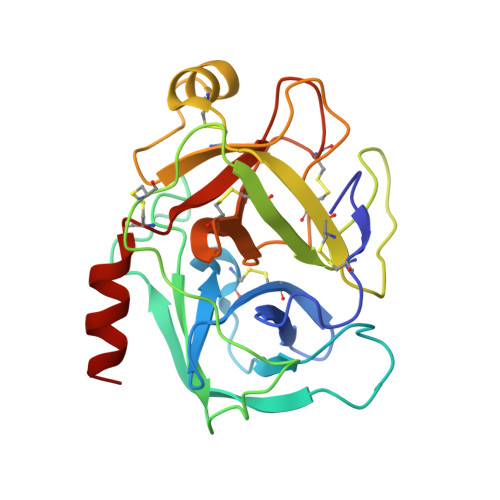Clustering of atomic displacement parameters in bovine trypsin reveals a distributed lattice of atoms with shared chemical properties.
Gagner, V.A., Lundholm, I., Garcia-Bonete, M.J., Rodilla, H., Friedman, R., Zhaunerchyk, V., Bourenkov, G., Schneider, T., Stake, J., Katona, G.(2019) Sci Rep 9: 19281-19281
- PubMed: 31848402
- DOI: https://doi.org/10.1038/s41598-019-55777-5
- Primary Citation of Related Structures:
6SUX, 6SV0, 6SV6, 6SV8, 6SV9, 6SVB, 6SVD, 6SVG, 6SVI, 6SVJ, 6SVN, 6SVR, 6SVU, 6SVV, 6SVW, 6SVX, 6SVZ, 6SW0 - PubMed Abstract:
Low-frequency vibrations are crucial for protein structure and function, but only a few experimental techniques can shine light on them. The main challenge when addressing protein dynamics in the terahertz domain is the ubiquitous water that exhibit strong absorption. In this paper, we observe the protein atoms directly using X-ray crystallography in bovine trypsin at 100 K while irradiating the crystals with 0.5 THz radiation alternating on and off states. We observed that the anisotropy of atomic displacements increased upon terahertz irradiation. Atomic displacement similarities developed between chemically related atoms and between atoms of the catalytic machinery. This pattern likely arises from delocalized polar vibrational modes rather than delocalized elastic deformations or rigid-body displacements. The displacement correlation between these atoms were detected by a hierarchical clustering method, which can assist the analysis of other ultra-high resolution crystal structures. These experimental and analytical tools provide a detailed description of protein dynamics to complement the structural information from static diffraction experiments.
- Department of Chemistry and Molecular Biology, University of Gothenburg, Gothenburg, Sweden.
Organizational Affiliation:



















